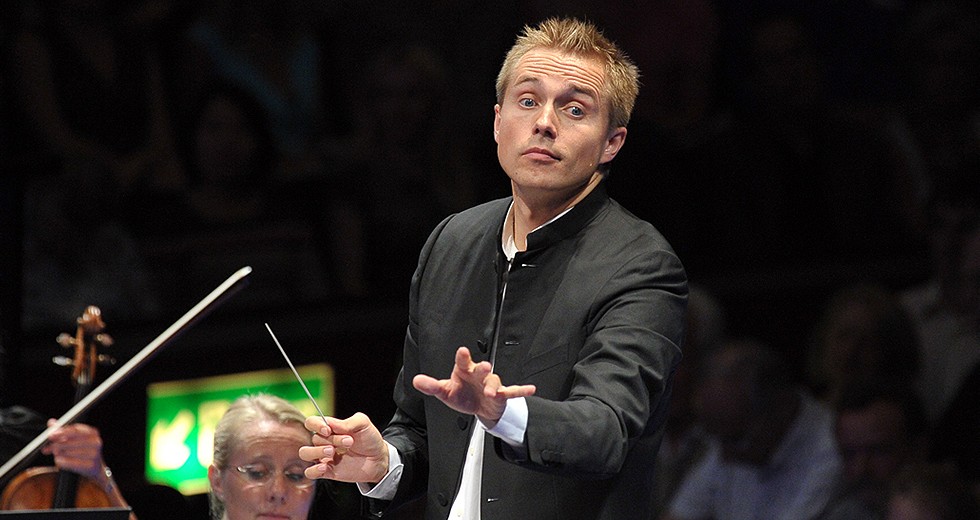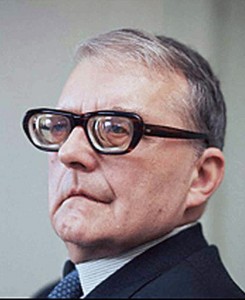
For his return to the Chicago Symphony Orchestra, rising young conductor Vasily Petrenko will lead a program that includes works by Edward Elgar, Ludwig van Beethoven and one by a fellow Russian, Sergei Rachmaninov.
To conclude the program, which will be performed Jan. 8-10 and Jan. 7 in an Afterwork Masterworks concert, CSO officials requested a work by Rachmaninov, and Petrenko selected the composer’s Symphonic Dances, Op. 45, his final work, written three years before his death in 1943. “It’s in many ways, his autobiographical piece, written toward the end of his life but reflecting on all that has happened with the Russian empire and all that has happened in his life,” Petrenko said. Rachmaninov, who fled the Russian Revolution in 1917 and ultimately settled in the United States, believed in a “sacred force” that would return to Russia and cleanse it of the terror and tribulation under communist rule. “That’s why, toward the end [of the work], there is a quotation from his Vespers,” he said. “And it’s really like a spiritual army going to clear the country. However, at the very end, with the tom-tom, he still asks the question: Is it?”
Less frequently performed than some of Rachmaninov’s other orchestral works, Symphonic Dances was last heard in Orchestra Hall in 2012 with guest conductor David Robertson. “Technically,” Petrenko said, “it’s a very demanding piece for the orchestra, so you need to know exactly how to rehearse it and what to rehearse. And you need a very, very fine orchestra to play this piece at its best.”
As chief conductor of the Royal Liverpool Philharmonic Orchestra, Petrenko, 38, has become a fan of Elgar, so he suggested the English composer’s In the South (“Alassio”) (1903-04) to open the CSO program. Though almost never considered together, Elgar and Rachmaninov actually share several elements in common, including similar approaches to melody, orchestration and compositional structure, Petrenko points out. “I don’t think that in Chicago, Elgar, especially In the South, is played very often,” he said. “That’s a great piece of music, and Elgar is a great composer. So I hope, in the future, to bring one of his symphonies, which are amazing pieces of music, and give this music to the audience in Chicago.”
For the third piece on this week’s program, Petrenko knew that Paul Lewis was booked for the concerts, and since the English keyboardist is considered to be one of the leading Beethoven interpreters of his generation, the conductor suggested that he perform a piano concerto by the famed composer. Lewis, 42, a native of Liverpool, has performed the complete set of Beethoven piano concertos with Petrenko and the Royal Liverpool Philharmonic. For the CSO concerts, he will be featured in the best known of the works, the Piano Concerto No. 5, Emperor.
But another composer, a fellow Russian, Dmitri Shostakovich, has captivated Petrenko in the last few years. For the November edition of BBC Music magazine, the editors asked Petrenko to comment on each of Shostakovich’s emotionally revealing, often gut-wrenching 15 symphonies. The choice of Petrenko was hardly a lark. Recently released was the 11th and final installment in the Russian maestro’s much-praised set of recordings of the entire symphonic cycle with the Royal Liverpool Philharmonic — a project he began in 2006 for the Naxos label. In the magazine spread, Petrenko offers probing, insightful and quite personal takes on each of the works, which span Shostakovich’s tormented career and much of the history of the Soviet Union. (The article is not available online but Petrenko’s comments on the cycle were recorded for a promotional video.) As part of his CSO debut program in 2012, Petrenko led the orchestra in Shostakovich’s Symphony No. 10.
Born in St. Petersburg a year after Shostakovich’s death in 1975, Petrenko feels a close affinity for the composer’s music. St. Petersburg, known as Leningrad during the Soviet era, is where Shostakovich spent much of his life, and it’s where Petrenko sang the composer’s songs in the city’s Capella Boys Music School.
“When I hear his music, I can almost see the visual images of the different Leningrads, depending on the time and year, and it’s pretty strong in my mind,” he said. “So for me, he’s a composer who was writing and composing about his life in the city in the 20th century. Of course, it’s autobiographical like any composition of every composer, but it’s also about the history of the country and it’s also about the history of the city: how the city was starving, how the city was fighting, who were the people of the city, what they were doing, what they were thinking.”
In addition, the conductor has read a great deal about Shostakovich and has made a point getting to know some of the people who knew him and collaborated with him. During a recent guest conducting engagement with the Israel Philharmonic, for example, he met a violinist who took part in the premieres of some of Shostakovich’s final works. “Part of this history is still alive in people,” he said. “Of course, a big part of it is still alive in the buildings and the spirit of the city, and the rest is music.”
For Petrenko, the biggest misconceptions about Shostakovich relate to the music’s politics. In the West, he said, people tend to exaggerate the political ramifications, and in Russia, people try to deny the political overtones and focus on the autobiographical aspects. “I think it is more of a combination of his own life, plus, of course, what was happening in the political life [of the Soviet Union] and just in the simple life of the people there,” he said. When he performs Shostakovich’s symphonies in the West, the conductor tries to get across the point that the music is not just about communist oppression. “Last week, I did the Tenth Symphony, and I was saying that it’s not just about [Joseph] Stalin but it’s about tyranny in general, and there’s also a love story in this symphony, which you need to know.”
During the recording project, Petrenko encountered many surprises, including some in the Second and Third symphonies. Although often dismissed as “laboratory study pieces,” they actually offer intriguingly “grotesque and satiric” takes on the banal “proletariat poetry” that is incorporated in both, Petrenko believes. “Maybe for me the biggest discovery was that his style was transfiguring and changing over the time, and of course, his messages were very different, but there is so much in common in all the symphonies,” he said. “What is most important is that he is always honest. He’s always honest with himself. He can always encrypt it for official reasons, but the music is always honest. The music is always giving everything he thinks at the moment.”
Petrenko began his career in 1994-97 as resident conductor of the Mikhailovsky Theatre (formerly the Mussorgsky Memorial Theatre of the St. Petersburg State Opera and Ballet), where he now serves as principal guest conductor. He is in his second season as chief conductor of the Oslo Philharmonic, but his most important musical ties are to the Royal Liverpool Philharmonic, one of Europe’s oldest orchestras, founded before the New York Philharmonic and even the Vienna Philharmonic. After an appearance with the orchestra in November 2004, he was named principal conductor, a title that was later changed to chief conductor. After several contract extensions, he now operates under an open-ended contract in which he is expected to give three years’ notice should he wish to leave. “We are still enjoying each other,” he said, “which, I would say, is nowadays quite rare.”
The Royal Liverpool Philharmonic is the midst of a £13.5 million renovation of its 1939 Art Moderne-style hall. Already completed are upgrades to the auditorium’s interior, which has resulted in what Petrenko describes as a “bright, better acoustic.” Expected to be finished in the summer of 2015 are such remaining changes as new practice rooms and the addition of a smaller hall for chamber music. “It [will mean] a lot of improvements when it’s all reopened,” he said, “and I’m very much looking forward to what impact it will make on the orchestra.”
The refurbishments coincide with the orchestra’s 175th anniversary in 2015. To celebrate that milestone, the ensemble is undertaking tours to Central Europe and Japan and presenting a range of special events, including reconstructions of some of the programs from its inaugural season. “So there’s a massive amount of excitement and massive amount of projects ahead,” Petrenko said, “and I’m very much looking forward to future cooperation with the band.”
Kyle MacMillan, former classical music critic for the Denver Post, is a Chicago-based arts writer.
